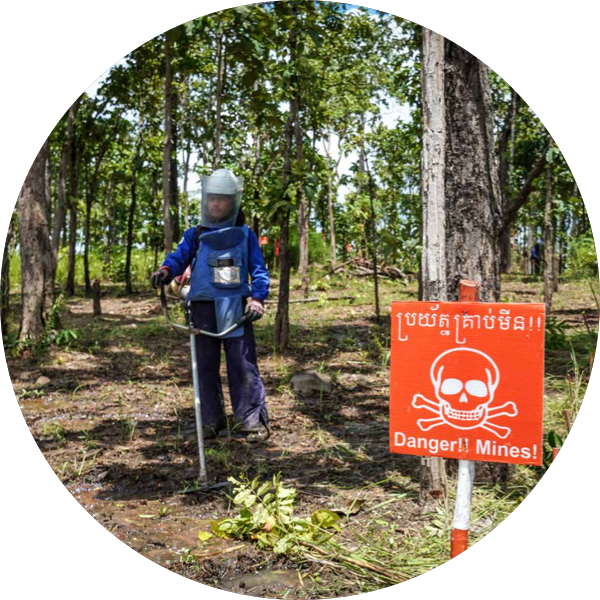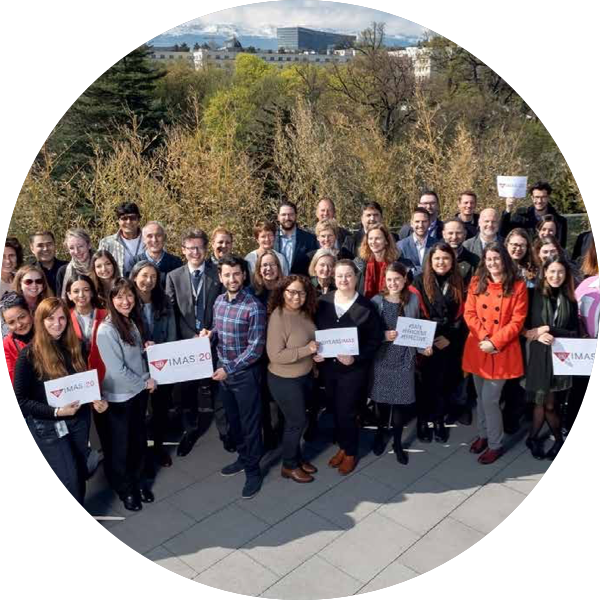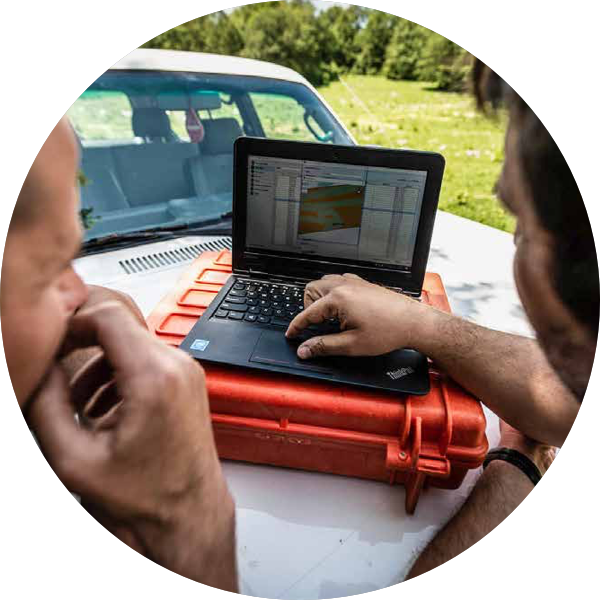Introduction
Every year, across the world, millions of civilians bear the brunt of landmines, cluster munitions and other explosive ordnance. Lives are lost or irreparably damaged, as survivors and their families struggle with the physical, psychological, social, and economic consequences of accidents. The presence of explosive ordnance is not just a threat to the physical safety and wellbeing of people. It is also a key obstacle to the timely and effective delivery of humanitarian aid, post-conflict stabilisation, recovery and reconstruction, peace, and sustainable development.
Read more
The Geneva International Centre for Humanitarian Demining (GICHD) works to reduce risks to communities stemming from all types of explosive ordnance: landmines, cluster munitions, explosive remnants of war, and unsafely and insecurely managed conventional ammunition.
The GICHD is guided by the vision of a world free from the risks posed by all types of explosive ordnance, where individuals and communities can thrive. In such a world, people are safe from the threat of physical harm. They live in communities where explosive ordnance is no longer an obstacle to livelihoods and does not limit access to fundamental services. Individually, as well as collectively, they can work towards a just, stable, inclusive, and sustainably prosperous society.

Strategic way forward 2023 – 2026
The GICHD enters the new strategic period building on progress and lessons learnt through 25 years of support to mine action and more broadly explosive ordnance risk reduction in over 60 countries around the world. Responding to an evolving global, normative, and operational context, the Centre will follow four main strategic directions: consolidating work in its traditional and recent areas of activity; enhancing its conflict-sensitive approach; facilitating the development of national capacities and promoting national ownership and good governance; furthering connections between explosive ordnance risk reduction and global agendas on humanitarian action, development, and peace.
Vision

A world free from explosive ordnance risks, where communities thrive.
Mission

The GICHD helps to develop and professionalise explosive ordnance risk reduction, promoting innovative, tailored, and sustainable solutions.
STRATEGIC OBJECTIVES

International obligations are fulfilled, national targets are reached.

Communities’ protection from and resilience to explosive harm are enhanced.

Explosive ordnance risk reduction enables humanitarian action, development, and peace.

Explosive ordnance risk reduction advances gender equality, diversity, and inclusion.
OUTCOMES

1. Multilateral processes are informed by evidence and supported by expert advice.

5. The impact of explosive ordnance risk reduction is enhanced through connections with global agendas.

2. National responses are framed by strategies, regulated by up-to-date standards, and enabled by information management.

3. Operations are implemented safely, effectively, and efficiently.

4. Gender and diversity are mainstreamed, and equality and inclusion promoted in explosive ordnance risk reduction.
HOW THE GICHD WORKS
The GICHD carries out its mission through four distinct and mutually reinforcing lines of service, working in collaboration with and in support of partners around the world.
Generating Knowledge
The Centre generates knowledge products (analyses, concepts, methods, and tools) to strengthen and broaden the knowledge base required towards enhancing the effectiveness, efficiency, and sustainability of explosive ordnance risk reduction. Our knowledge products are developed through a collaborative and needs-based approach by distilling lessons learnt from the field and taking full advantage of the latest analytical, conceptual, methodological, and technological advances.
Disseminating Knowledge
The Centre disseminates knowledge to partners at global, regional, and national levels to strengthen their level of information, capacities, and capabilities. Knowledge products (analysis, concepts, methods, and tools) are contextualised responding to partners’ varied needs and interests. Dissemination is carried out in diverse ways using a variety of methods (information, advice, and training) and tools (online, hybrid, and in person). We will give priority to national actors, in particular national authorities and national operators, to develop local capacities and support national ownership. Relationships, cooperation, and exchange with local actors are vital to understand contexts and needs.
Supporting The Codification Of Knowledge
The Centre supports the development and strengthening of standards and norms at global, regional, and national levels. We do so to promote international normative frameworks and to ensure that field operations are conducted in accordance with good practice. We work within the frame provided by the respective governance bodies of the IMAS and the IATG and partner with mine action and ammunition management stakeholders in this regard.
Fostering Partnerships, Dialogue, And Cooperation
The Centre fosters partnerships, dialogue, and cooperation at global, regional, and national levels. In doing so, we rely on our unique convening position and aim primarily, but not exclusively, to uphold and strengthen the support we provide to partners through our other lines of service. Strengthened trust with partners and the establishment of strategic professional networks are concrete manifestations of our role in fostering partnerships, dialogue, and cooperation.
Strategy Structure

The Strategy structure, comprises three pillars: the Theory of Change describes the purpose of the Centre and the impact it aims to achieve, distilled into strategic objectives and outcomes; the Financial Pillar lays out the priorities the Centre will pursue to improve financial sustainability and efficiency in resource management; the Institutional Pillar summarises how the Centre will adapt its own structures and processes to be fit for purpose and in sync with its core values and working principles. A coherent system of monitoring and evaluation will be applied to measure progress in each of these pillars and collect evidence that will provide the foundation for strategic steering, activity planning, and reporting.
Financial Pillar
The financial pillar ensures an adequate level of financial resources to deliver impact and allows for these resources to be efficiently managed.
Read more
1. Funding quality is improved
2. Budgeting reflects needs and results
3. Cost efficiency is enhanced
4. Financial resilience is increased

Institutional pillar
The GICHD is a thriving organisation where people are empowered and supported to deliver impact.
Read more
1. Everyone contributes to an inclusive and enabling culture, creating a healthy working environment
2. Investment in people maximises individual potential and collective capabilities to deliver impact
3. Policies and procedures are efficient and agile to strengthen impact
4. Ways of working ensure timely and effective responses to sector needs

Monitoring & evaluation
Since 2015, the GICHD has relied on a results-based management (RBM) system to measure progress against its objectives and outcomes, guide planning, and report on results. Underpinned by a Theory of Change (ToC) defining strategic objectives and measurable outcomes, and supported by a monitoring framework, such a system has been refined and improved over the years to ensure that the Centre can focus on results, rather than inputs, learning and adapting as necessary to be able to deliver on its vision.
Read more
This approach will be maintained and enhanced in the new strategic cycle, to ensure the Centre has the appropriate tools to gauge progress in all three pillars of the 2023-2026 Strategy, namely, the Theory of Change, the Financial Pillar and the Institutional Pillar. Each pillar will be fitted with a monitoring framework. Based on data — quantitative and qualitative — routinely collected through the Centre’s activities across the pillars, these frameworks will make it possible to assess progress towards the respective objectives and outcomes, identify implementation challenges, adapt to overcome such challenges or to meet unforeseen needs, and report on results

Core values & working principles
The Centre is guided by the core values of trust, inclusion, learning, respect, accountability and innovation, and follows six working principles across the board of its activities.
CORE VALUES

TRUST
We work with utmost integrity, communicating transparently and honestly.

RESPECT
We are collaborative, valuing diverse perspectives with a compassionate and empathetic mindset.

INCLUSION
Diversity, equality, and inclusion are central to who we are and how we work.

ACCOUNTABILITY
We are accountable to each other, our partners and those who support us, driven by needs and impact.

LEARNING
We are humble and strive to continuously improve to maximise impact.

INNOVATION
We are creative and agile in the face of challenge and empowered to take risks to accelerate change.
WORKING PRINCIPLES

Uphold the humanitarian principles of humanity, neutrality, impartiality, and independence

Support the development of institutions, processes, and capacities as a means for sustainable, nationally owned responses

Adopt a conflict-sensitive approach to minimise negative impacts and maximise positive impacts of the Centre’s interventions

Mainstream gender and diversity consid- erations in all aspects of the Centre’s work, promoting participation and inclusivity

Embrace a spirit of interconnectedness and partnership, building on partners’ comparative advantages

Integrate environmental considerations in all aspects of the Centre’s work
